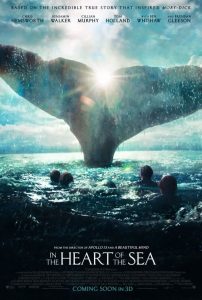DIRECTOR: Ron Howard
CAST: Chris Hemsworth, Benjamin Walker, Cillian Murphy, Tom Holland, Brendan Gleeson, Ben Whishaw, Michelle Fairley, Gary Beadle, Frank Dillane, Charlotte Riley, Donald Sumpter, Brooke Dimmock, Jamie Sives
RUNNING TIME: 122 mins
CERTIFICATE: 12A
BASICALLY…: In 1820, the whaling ship Essex is sunk by an enlarged bull sperm whale – the events of which would inspire the classic story of Moby Dick…
NOW FOR THE REVIEW…
Herman Melville’s Moby Dick is a classic piece of literature that somehow makes the art of whaling look like an intimidating and frightening tale of obsession and revenge, one that to this day remains an essential book for keen readers to store in their library.
But In the Heart of the Sea isn’t Moby Dick, as much as it wants to be, but is instead the story of a true event that INSPIRED the crux of the story in the first place – in fact, the framing device is of Melville (Ben Whishaw) listening to former cabin boy Thomas Nickerson (Brendan Gleeson) recounting his own experiences, as research for his new book – one that truthfully makes you wish you were reading Moby Dick instead.
Not that there’s anything in director Ron Howard’s film that outright infuriates us Pan-style, but this is a case where you’re left without caring much about what’s going on, and you find that perhaps a more straightforward adaptation of Moby Dick would have been slightly more entertaining.
In the film, Nickerson tells Melville how, when he was a young cabin boy (Tom Holland), he set sail on the whaling ship Essex under the authority of Captain George Pollard, Jr. (Benjamin Walker, who we’re absolutely convinced is a clone of young Liam Neeson) and first mate Owen Chase (Chris Hemsworth), as well as a bunch of other crew members who we’re never given any understanding as to who they actually are. During their whale-slaughtering voyage – all for the sake of oil, apparently – their ship is left devastated after an attack by an enlarged bull sperm whale, and the surviving crew are forced onto lifeboats where the struggles for survival begin.
That’s all well and good, but again the problem is that the script doesn’t give us much reason to care about any of these characters. Most if not all of them are stuck with the most basic of traits (oh, there’s the wise one! Oh, there’s the entitled jerk! And so on) that don’t seem to develop in any way shape or form even as the worst stuff happens to them after the whale attacks. Hemsworth, for instance, doesn’t seem to have much going for his character other than he’s got a family waiting home for him (of course), and he’s mighty peeved that he wasn’t given his promised position as captain, but that’s really it (not helping is that the native Australian keeps slipping in and out of his attempted Boston accent, making him unintentionally sound like if Thor had been struck on the head with his hammer Mjölnir). His acting is never a problem, but he’s stuck with a basic bland hero role he’s forced to make more credible than it is.
There’s nothing wrong with Howard’s direction as a whole, either – production-wise it looks decent enough, and though the visual effects aren’t great they’re completely serviceable – although the cinematography can be a little odd at times. Every so often throughout the film, we are treated to shots taken from camera angles that are strangely placed on random objects like a pole or even the wooden floor, sometimes tilted at a Battlefield Earth-style angle, which capture the action while everything but the object appears to move. It’s fine the first few times, but by the 10th or so time it’s not only old but it starts to take you out of the film when you start to think about how they achieved these shots in the first place.
The framing device, as mentioned earlier, is also a slightly misguided way to tell this particular story. Not only does it take away any suspense when you know the person telling this story is going to survive, but it serves as a cop-out for the filmmakers when they’re trying to portray the more graphic details – a pivotal decision late in the film suddenly cuts back to Gleeson telling Melville, and by extension us, exactly what happened next in full detail, foregoing that pesky “show, don’t tell” piece of filmmaking 101 for the sake of a more accessible rating. It’s a shame, because Howard is a good director that hasn’t shied away from certain extremes in the past, yet he’s constantly giving himself an out through this device that solves his problems for him.
By no means is it a bad film, but In the Heart of the Sea just doesn’t give you much to care about to make it worthwhile viewing. You’re probably better off reading Moby Dick, instead.
SO, TO SUM UP…
In the Heart of the Sea boasts serviceable production values, some odd cinematography aside, but you ultimately don’t end up caring about anyone or anything thanks to a dramatically-light script.


